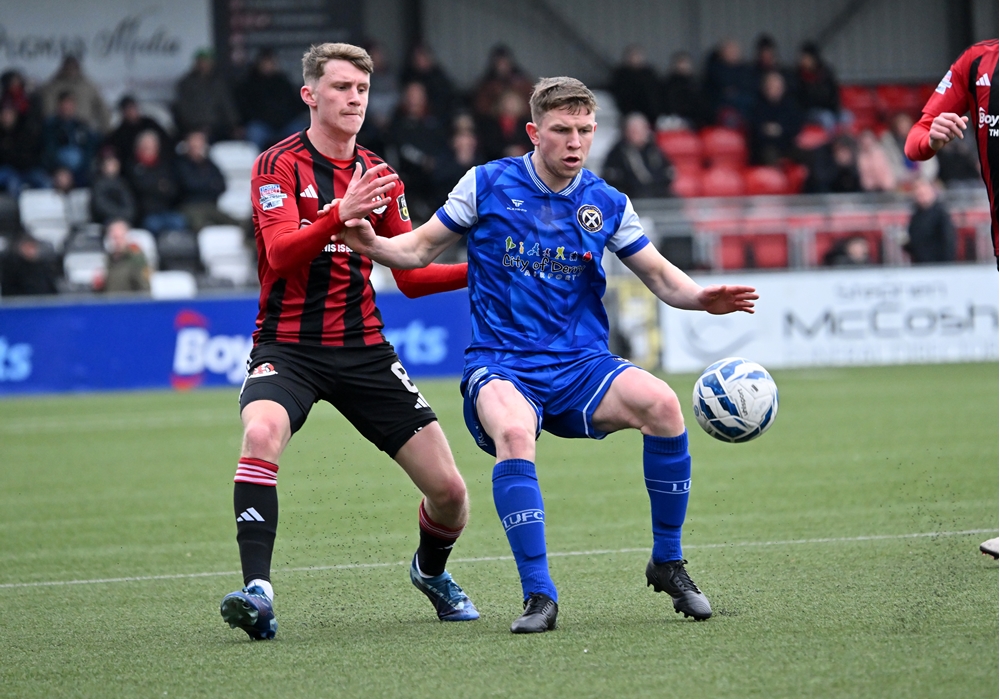
The Irish Football Association Appeals Committee
In the matter of an Appeal by Mr Gary Hamilton
Against a decision of the Irish Football Association Disciplinary Committee
Made on the 19th October 2016
Mr Adam Wood, Independent member – with whom all members of the Appeals Committee agree.
Introduction
[1] This is an appeal pursuant to Article 14.2 of the Irish Football Association (‘IFA’) Articles of Association (‘AoA’) by Mr Gary Hamilton (‘Mr Hamilton’) against a decision of the IFA Disciplinary Committee (‘DC’) made on the 19th October 2016. This appeal concerns two charges:
i. A dismissal for violent conduct under article 14.7 of the Disciplinary Code. This relates to an allegation that Mr Hamilton attempted to strike an opponent by means of a punch, as outlined in the disciplinary report form submitted by match referee Mr Mervyn Smyth.
ii. A misconduct charge under article 18.13 of the Disciplinary Code. This relates to post match comments made by Mr Hamilton to the match referee Mr Mervyn Smyth which amounted to unsporting conduct towards a match official, as outlined in the misconduct report form submitted by match referee Mr Mervyn Smyth.
[2] Mr Paul Bacon BL and Mr Lawrence McMahon, Solicitor, appeared for Mr Hamilton along with Messrs Adrian Teer, Paul Millar and Mark Ferguson, all representatives of Glenavon FC. Mr Paul Livingstone, DC Chairman, and Mrs Rebekah Shearer, IFA Disciplinary Manager, represented the DC. We are indebted to all those involved for the considerable assistance that we derived from their carefully prepared, helpful and well delivered written and oral submissions.
Background
[3] This appeal concerns the actions of Mr Hamilton both during and after a match that took place on 17th September 2016 at Stangmore Park between Dungannon Swifts FC and Glenavon FC, and the resultant disciplinary proceedings before the DC on 19th October 2016 which led to Mr Hamilton receiving a suspension of four matches with an additional 2 matches suspended for a probationary period of six months, said suspension made up as follows:
i. Two match suspension for violent conduct under article 14.7 of the DC relating to the ‘attempted punch’ incident (automatic suspension already having been served).
ii. Two match suspension and £100 fine for unsporting conduct under article 18.13 of the DC relating to the post match comments, with a further two matches suspended for a probationary period of six months.
[4] It should be noted that with respect to [3]ii above, the DC used its discretion under article 16 of the Disciplinary Code to vary what would properly have been a four match suspension under article 18.13 of the Disciplinary Code downwards to a two match suspension with a further two matches ‘suspended’ as outlined above. This will be discussed in further detail below.
[5] A disciplinary report received from referee Mr Mervyn Smyth on Sunday 18th September 2016 indicates that Mr Hamilton was dismissed in the 84th minute of the match for violent conduct, and in his description Mr Smyth indicates that;
“the above player was dismissed from the field of play following an off the ball incident; I observed the player attempting to strike an opponent by means of a punch”.
[6] A misconduct report received from referee Mr Mervyn Smyth on Sunday 18th September 2016 further outlines post match comments made by Mr Hamilton, which occurred in or about the referee’s changing rooms;
“…A few minutes later Mr Hamilton then knocked the officials changing room and entered the room. He continued to act in an irresponsible manner, questioning my decision to dismiss him from the field of play in an aggressive manner. Mr Hamilton started shouting and was heard calling me a liar and again questioning my integrity through repeatedly stating ‘how can you call yourself a Christian’…”
[7] Submissions made by assistant referees Gareth Eakin and David Anderson do not assist with respect to the initial red card for violent conduct. Both claim to be unsighted and unable to view the incident. Neither does fourth official Arnold Hunter, who claims his back was turned to play, communicating with Glenavon FC assistant manager Paul Millar. All three match officials are however clear in that Mr Hamilton behaves aggressively post match in the officials’ changing room, calling referee Mr Smyth a ‘liar’ and questioning his faith with comments such as ‘how can you call yourself a Christian?’.
[8] BBC footage was made available which shows a robust challenge between Dungannon FC player Mr Hegarty and Mr Hamilton, at which point the players entangle, both on the ground. Referee Mr Smyth can be viewed running towards the players in close proximity, and just before the referee obscures the camera angle, Mr Hamilton’s right hand can be seen moving towards Mr Hegarty. What happens after that is obscured by the referee. After a brief ‘set to’ between the two players, Mr Smyth swiftly produces a red card to Mr Hamilton.
[9] Audio recording of an interview which Mr Hegarty gave to local press was also made available, which indicates Mr Hegarty stating that he did not feel a punch, and believed the incident to be ‘handbags’.
Disciplinary Committee Decision of 19th October 2016
[10] With respect to the charge as outlined at [1]i above, the DC found having considered the disciplinary challenge by Glenavon FC along with other evidence as outlined above, that Mr Hamilton had attempted to punch an opponent and that the referee had not made an obvious error. The penalty imposed was as at [3]i above.
[11] With respect to the charge as outlined at [1]ii above, the DC found having considered the disciplinary challenge by Glenavon FC along with other evidence as outlined above, that Mr Hamilton had made comments amounting to unsporting conduct towards a match official. The penalty imposed was as at [3]ii above.
[12] The outcome of this decision was communicated in writing to Glenavon FC on Thursday 20th October 2016 and appeal was subsequently lodged by Mr Hamilton.
Mr Hamilton’s Appeal
[13] An email received from Mr Hamilton’s legal representatives dated 22nd November 2016 outlines the basis of Mr Hamilton’s appeal, in brief summary:
i. Unreliability and inadmissibility of the referee’s match report grounded on the fact that Mr Smyth indicates at the time of sending off, and post match, that Mr Hamilton is dismissed for a series of punches and even demonstrates the actions to Mr Hamilton, but subsequently and by admission having watched the TV footage overnight, lodges a match report indicating one single attempted punch.
ii. Unreliability and inadmissibility of the evidence of referee Mervyn Smyth given his admitted change of explanation for Mr Hamilton’s sending off.
iii. The referee’s match report must be seen as the bedrock for disciplinary matters as a first note of events, and this match report is inaccurate as set against Mr Smyth’s initial explanation to Mr Hamilton and on the grounds of sporting justice the match report should be inadmissible and the charges should fall.
iv. Neither an attempted punch nor an actual punch can be seen on the BBC footage.
v. Mr Hamilton’s good character throughout a lengthy career in both Northern Ireland and England.
vi. Due to the above the violent conduct charge should be dismissed, and if this is the case the unsporting conduct charge should also be dismissed, as Mr Hamilton’s post match comments and behaviour was a ‘reasonable and rational response’.
Written statement from Mr Hamilton
[14] The Appeals Committee also had the benefit of a written statement from Mr Hamilton served on the day of the hearing. This document summarises Mr Hamilton’s position on both charges. With respect to the allegation of violent conduct it was Mr Hamilton’s case that having become entangled, he and Mr Hegarty grabbed at each other in order to steady themselves and ultimately get to their feet. At this point a red card was produced by Mr Smyth which puzzled Mr Hamilton. Mr Hamilton asserts in his statement that the referee told him it was for ‘a series of punches’. This was again demonstrated by referee Smyth in the changing rooms post match. Mr Hamilton also asserts that he interjected in a press interview with opposing player Mr Hegarty post match;
“Mr Hegarty said that he felt no punch and the incident could best be described as ‘handbags’ and that he thought he was connected by my feet.”
Mr Hamilton also comments on the changes made to the referee’s match report;
“The referee clearly watched the BBC footage of the incident, prior to drafting match report as the footage clearly does not show a series of punches. The referee subsequently drafts his match report which then states I attempted to punch Hegarty thereby constituting violent conduct.”
Mr Hamilton is clear as to why this has happened;
“I am confident In my assertion that the referee has not only got the decision to dismiss me as wrong however has blatantly lied in his decision to do so as he has a personal animus against me”.
[15] With respect to the unsporting conduct charge, Mr Hamilton concedes in his statement
“As a consequence I said to the referee ‘Call yourself a Christian – you’re no f*****g Christian’ and ‘you’re telling lies’…I felt utterly justified in the manner in which I approached the referee post match as I was dismissed on the basis of an outright lie’.
The Appeal Hearing
[16] The Appeals Committee had the benefit of Mr Hamilton’s appeal email and written statement, as outlined above, along with written submissions from the DC and the material outlined in numbers [5] to [9] above. It was apparent from the DC’s written submissions that they did not believe that the misconduct charge under article 18.13 was being appealed, however they were able to make oral submissions to the Committee in this regard. The Committee heard from the DC, Mr Hamilton’s legal representatives, and Mr Hamilton himself.
Mr Hamilton’s case
[17] Mr Bacon BL, on behalf of Mr Hamilton, expanded on Mr Hamilton’s appeal email, indicating the contradiction between what referee Smyth said at the time, and what appeared in the match report, placing emphasis on the fact that Mr Smyth accepted having completed the match report after viewing CCTV footage. With respect to the violent conduct incident, what he sees at the time, submitted Mr Bacon, must be treated as the best source of information, and rather not what Mr Smyth gleans from subsequent BBC footage. This could not be right and struck at the integrity of the whole process.
[18] It was not just Mr Hamilton’s case that Mr Smyth had made an obvious error in awarding the red card against him. Mr Hamilton was clear that Mr Smyth was telling lies against him. Mr Bacon did not shy away from the import of this statement, but was adamant that this was an outright lie. The contention in Mr Hamilton’s statement was repeated in oral submission by Mr Bacon, that referee Smyth had an animus against Mr Hamilton, and cited previous incidents in which Mr Smyth had been involved in controversial refereeing decisions against Mr Hamilton, in support of this assertion. Indeed, the panel was told that out of five red cards in Mr Hamilton’s entire playing career, Mr Smyth had awarded three of them.
[19] Moving to the later allegation of unsporting conduct, Mr Bacon then submitted that as a result of the above context Mr Hamilton felt justified in confronting Mr Smyth, as he could only have had a personal agenda against him. Mr Bacon explained to the Committee that Mr Hamilton was candid in saying Mr Smyth was ‘not a fucking Christian’ and was indeed challenging his integrity, and calling him a liar.
[20] The Committee was urged to consider that the two charges were inter related. Due to the agenda shown by the referee going beyond an obvious error, Mr Hamilton is entirely justified in making the comments that he himself accepts that he made. Whilst accepting that the language was intemperate, the Appeals Committee was urged to understand that this was a ‘hot house environment’, and not the Malone Park Croquet Society. If the Committee finds that an obvious error occurred, or worse, then we must dismiss both charges, we were told. It had to be the case that these comments were not unsporting conduct, but that this was an obvious sporting injustice.
The IFA Disciplinary Committee case
[21] The DC’s case with respect to the violent conduct allegation was summarised in their written submissions and Mr Livingstone for the DC affirmed that having heard the evidence previously, the DC were of the view that no obvious error had occurred. They had been satisfied with referee Smyth’s version of events, and with his credibility. Having viewed the BBC footage, as directed by the Referees Committee, Mr Smyth included the one incident that he was absolutely sure about. Whilst the footage was not conclusive, Mr Livingstone submits that it did support Mr Smyth’s view. The Disciplinary Committee expressed sympathy with Mr Hamilton, but stated that his appeal must fail.
[22] Mr Livingstone made oral submissions with respect to the unsporting conduct charge, and did not feel that the defence of ‘justification’ was made out. It was submitted that many managers suffer injustices but didn’t justify behaviour as displayed by Mr Hamilton. Mr Livingstone clarified that it was particularly Mr Hamilton’s use of language which made out the charge of unsporting conduct towards a match official.
[23] The Appeals Committee pushed Mr Livingstone as to why the DC had used their discretion to reduce the standard 4 match ban for unsporting conduct, downwards to 2 matches with 2 suspended. This was applied, we were told, as there was sympathy towards Mr Hamilton as they recognised that he had very strong feelings as to how he had been treated by referee Smyth.
Mr Hamilton and Mr Teer
[24] Mr Hamilton briefly addressed the Appeals Committee and when pressed if he still felt justified in his approach to Mr Smyth, responded in the affirmative, and that if someone was telling a blatant lie, you challenged them.
[25] Mr Teer, Chairman of Glenavon, also briefly addressed the Committee, and strongly defended his Player-Manager, adamant that poor language is used regularly in local football, and another sporting example of this was Test cricket, where ‘sledging’ was rife. Mr Teer was adamant that discipline within the club was second to none, and that there was an injustice that had been done on this occasion.
The burden of proof
[26] The burden in these proceedings rests with the IFA under articles 37.2 and 37.3 of the IFA Disciplinary Code to prove their case of the balance of probabilities. However, if the IFA are able to establish a prima facie case against Mr Hamilton with respect to the violent conduct charge, should he seek to assert that an obvious error has occurred, or worse in Mr Hamilton’s case, then the burden shifts to him to establish, on the balance of probabilities, using whatever evidence he wishes, that such an obvious error has occurred.
Conclusions
Violent Conduct
[27] With respect to the first charge of violent conduct, for Mr Hamilton’s appeal to succeed he must satisfy the Appeals Committee on the balance of probabilities that an obvious error has been made by the referee. Regardless, Mr Hamilton sought that we went further, and urged us to find that Mr Smyth had an agenda against him, and had told lies in support of this agenda. Mr Hamilton’s appeal email outlined the reasons why we should find in his favour, and these points were eloquently expanded on by Mr Bacon, as outlined above.
[28] We were not satisfied with any allegation made by Mr Hamilton regarding Mr Smyth’s integrity, as urged to do so by Mr Hamilton. We were not convinced by any reason advanced as to why Mr Smyth’s match report, or any evidence he had given to the disciplinary committee, should be excluded. The BBC footage of the incident, although by no means conclusive, shows Mr Hamilton’s hand moving towards his opponent, in the immediate aftermath of him receiving a robust challenge. Mr Smyth can be shown to be in close vicinity to the incident with nothing appearing to obstruct his view. Mr Smyth swiftly shows a red card to Mr Hamilton when the players get to their feet. Despite his initial comments as to what he believed he saw, Mr Smyth accepts that these were not correct having viewed subsequent footage, and his report reflects that.
[29] Dungannon FC player Mr Hegarty is interviewed after the match and by his own admission is not sure of what happened, but believed the incident to be ‘handbags’. This does not satisfy the Committee of any obvious error on the part of the referee, and that should not be seen to be a criticism of Mr Hegarty, who is merely reporting his version of events to local media.
[30] Mr Hamilton has not discharged the evidential burden which rests upon him in this instance, and the Appeals Committee is therefore not satisfied that there was any obvious error on the part of the referee. Nor, for that matter, is the Appeals Committee satisfied that there is any animus against Mr Hamilton from referee Smyth. This element of the appeal is dismissed and the original punishment stands as awarded by the DC ie two match suspension (automatic ban already having been served).
Unsporting conduct towards a match official
[31] The circumstances surrounding this element of Mr Hamilton’s appeal were concerning to the Appeals Committee as the Committee views it to be of the utmost importance that sporting integrity is upheld and promoted within local football at all levels. Mr Hamilton himself admits that he swore at referee Smyth and questioned his faith, as outlined at para [15] above;
“As a consequence I said to the referee ‘Call yourself a Christian – you’re no f*****g Christian’ and ‘you’re telling lies’…I felt utterly justified in the manner in which I approached the referee post match as I was dismissed on the basis of an outright lie’.
[32] The DC had extended some leniency toward Mr Hamilton having found against him in this respect at the initial hearing, using their discretion to reduce what should have been an automatic 4 match ban, downwards to a 2 match ban, with 2 matches further suspended for 6 months. The Appeals Committee were puzzled at this course of action by the DC, having found against Mr Hamilton. The DC Chairman could offer no explanation for using their discretion other than an element of sympathy that they felt towards Mr Hamilton for his perceived injustices.
[33] It is Mr Hamilton’s contention that this behaviour is justified due to the agenda against him that both he and Mr Bacon outlined. If the first charge of violent conduct falls, this unsporting conduct charge must also fall. They are inter linked, we are told.
[34] We do not accept that such comments can be justified by what happened before, even if we were to have found in Mr Hamilton’s favour with respect to the allegation of violent conduct. Players, referees, player-managers, club officials all have a duty to promote integrity, respect and fair play within the game. If our game were to lose these three pillars, its soul would be lost with it.
[35] The comments which Mr Hamilton concedes that he made amount to a deplorable lack of respect for a referee. We are satisfied that this behaviour amounts to unsporting conduct toward a match official. To swear at a referee while calling into question his Christian faith, is a personal attack on Mr Smyth which the Appeals Committee view as utterly unacceptable. Referees are an integral part of our game and all involved in football will accept they have a difficult job to do.
[36] Player behaviour towards referees is replicated in Junior league football, youth football and permeates through all levels of the game. That this incident occurred away from the eyes of the public does not, in our considered view, detract from its relevance or seriousness. Mr Hamilton, Glenavon FC and indeed all clubs in the Premiership must know that they represent the top level of football in Northern Ireland. They are the examples that the generation of tomorrow will look up to, and seek encouragement from.
[37] The Appeals Committee therefore also dismisses this element of Mr Hamilton’s appeal.
[38] The question the Appeals Committee must then turn to is the penalty initially imposed by the DC, reducing the ban from four games to two using their discretion under article 16 of the Disciplinary Code. The Appeals Committee finds this stance adopted by the DC hard to justify, particularly on the grounds advanced by the DC that sympathy was felt towards Mr Hamilton for his perceived injustices suffered.
[39] Article 18.13 of the Disciplinary Code clearly sets out that unsporting conduct towards a match official is met with a minimum four match suspension and a £100 fine. The Appeals Committee does not believe that the two match suspension imposed adequately reflects the gravity of the offence committed, nor does it act as a sufficient deterrent to other players. The conduct displayed towards referee Smyth by Mr Hamilton was aggressive, involved foul language, and attacked his Christian faith. This behaviour should not be tolerated by referees and will not be tolerated by this Appeals Committee.
[40] Article 14(6) of the IFA Articles of Association outlines the Appeals Committee’s powers on hearing appeals, and article 14(6)(f) in particular states that the Appeals Committee shall have the power to;
“Take any step which, in the exercise of its discretion, the Appeal Board considers appropriate, in order to deal justly with the case in question, but only within the parameters laid down by the FIFA and IFA Disciplinary Codes and these Articles of Association”.
It is the Appeal Committee’s view that the standard four match suspension and £100 fine should apply in this instance, given the above reasons, and the penalty imposed by the DC shall be varied accordingly.
[41] For the avoidance of doubt this means that Mr Hamilton is to serve a total suspension of 6 matches, this suspension to commence on Monday 5th December 2016.
The Irish Football Association Appeals Committee
Appeals Committee Members
Mr Joseph McCrisken – Chairman
Mr Enda Love – Football representative
Mr Adam Wood – Independent member
1st December 2016









